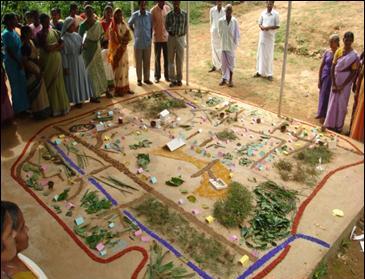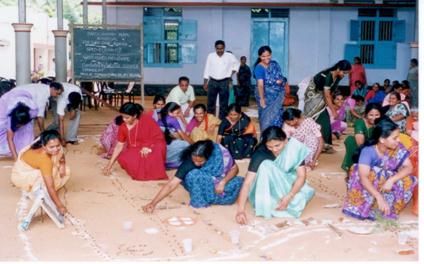
Save A Family Plan’s work in India is guided by the vision of “partnering with the poor for a just world”. This is really more than just a mission statement; it says a lot about the relationships that Save A Family Plan (SAFP) has with the recipients of its programs. Partnership implies that all the groups involved are seen as equally important to the development process and have something valuable to contribute. SAFP works hard to ensure that this belief is put into practice at all levels of the organization, from our contributors around the world to the families and communities receiving support in India.
Here at SAFP, we strongly believe that any development work must offer families and communities the opportunity to actively participate in the planning process and to take a central role in implementing the projects that we support. This approach can be seen throughout SAFP’s programs, all of which involve some type of training for the recipients and work to include as many different stakeholders as possible, including local governments, religious communities, local NGO’s (non-governmental organizations) and self-help groups (or sanghams). In our Community and Family Development Programs, all of these groups will come together in partnership with SAFP staff in India to decide what changes are needed in the community and how to implement these changes in a way that is beneficial to all.

What are the benefits of approaching development in this way? Here are just a few of the reasons why partnership matters so much.
1.) Makes use of Local Knowledge – Community members have a special understanding of the place in which they live, including knowledge about natural resources, characteristics of the land, weather and farming patterns, local customs and social order, political and religious dynamics, and relationships with outside communities. By including the whole community in the planning process, this important information can be used in decision making, which makes projects more likely to succeed.
2.) Improves Sustainability of the Projects – One major challenge in development work is ensuring that the project that has been implemented continues to be used and maintained after our work there is done. If a community has come together to plan a project and contribute their time, energy, and ideas, they will be more likely to feel a sense of ownership and carry on with the project after it has been completed. It is also likely that projects designed in a participatory way will be in tune with the needs and capability of the villagers, ensuring that it remains realistic and beneficial to keep it up.
3.) Encourages Learning for the Future – By participating in every step of the project, communities develop skills in organizing themselves, critically identifying problems, brainstorming solutions, planning, budgeting, accessing available funds and other local resources, and working together to make their plan a reality. After engaging in this process, they will have the skills and knowledge to address new problem as they arise and make changes in their community to continue moving forward in the future. They will also gain confidence by discovering what they are capable of with support from SAFP.
4.) Promotes Equality and Justice – Including recipients directly in the development process reflects the belief that everyone has something valuable to contribute and that all voice deserve to be heard. In the struggle for social justice, those who are the most poor and marginalized must be involved for change to take place. By helping these communities to take an active role in determining their futures, SAFP is working to promote a society built on equality and justice.
Check back in the coming weeks to learn more about some of the organizations that SAFP partners with in India and to get updates on the wonderful work they are doing in the field!
By Cassandra Griffin
SAFP Canada Staff

